Roosters and cockerels everything you need to know
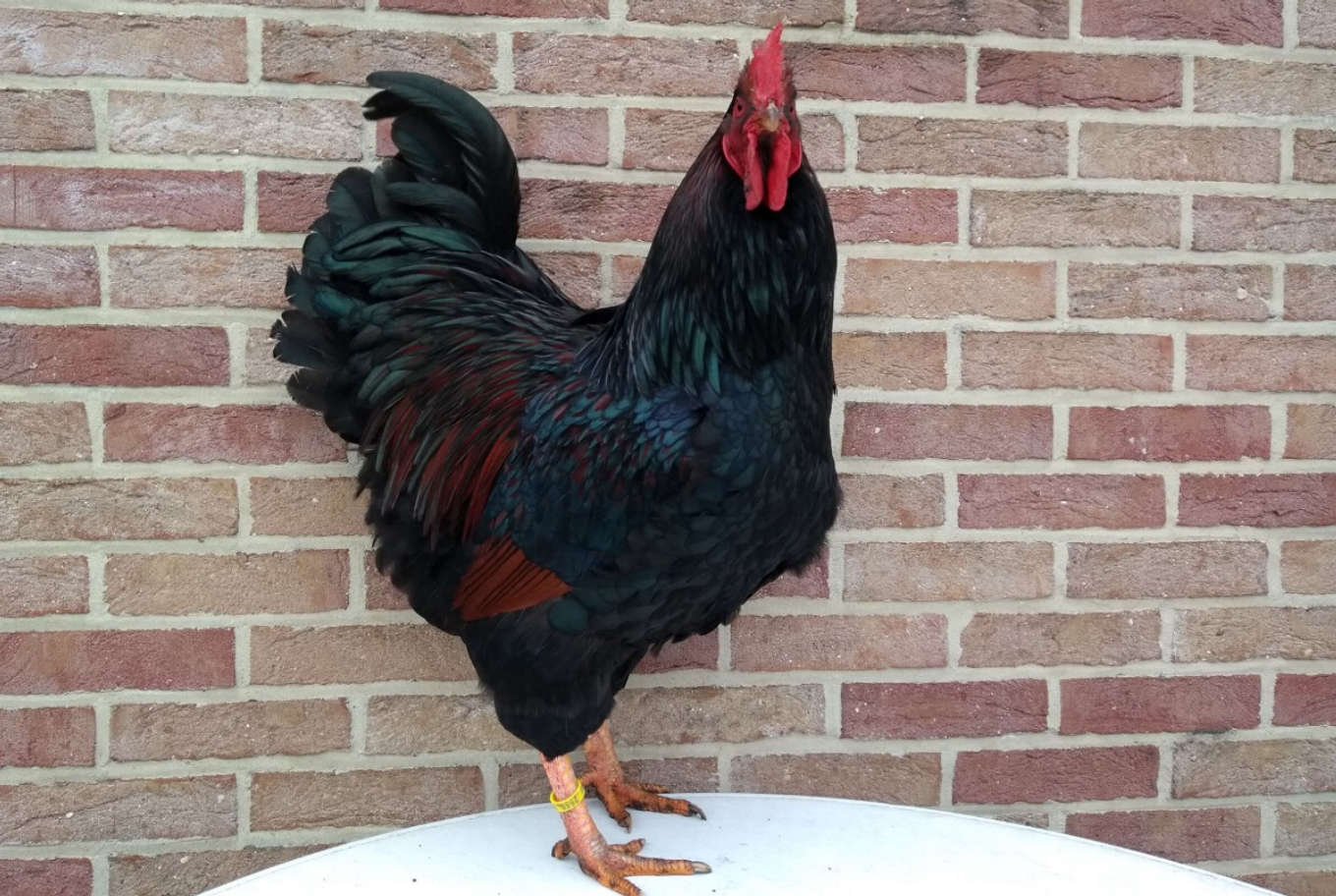
The terms "rooster" and "cockerel" both refer to male chickens, but they are used to describe different stages of the chicken's development.
Table of Contents
What is the difference between a cockerel and a rooster?
A cockerel becomes a rooster when he matured and was given a flock to roost with, hence he graduated to becoming a rooster.
- Cockerel: A cockerel is a young male chicken that is under one year of age. This term is typically used to describe a juvenile male chicken that has not yet reached sexual maturity. Cockerels are not fully grown and have not developed the physical characteristics of an adult rooster. They are often smaller and less colourful than mature roosters.
- Rooster: A rooster, on the other hand, is an adult male chicken that is over one year of age. At this stage, the male chicken has reached sexual maturity and fully developed its physical characteristics. Roosters are typically larger than cockerels and have more vibrant and distinct plumage. They are known for their crowing, which is a loud and characteristic vocalisation used to establish their territory and attract hens.
I have a lot of roosters, around 40 full grown at the moment and nearly as many in various stages from chick through grower.
I count myself lucky I keep docile breeds and rarely have a bad tempered Barnevelders.
Below: That said, here I am getting attacked by a cockerel.
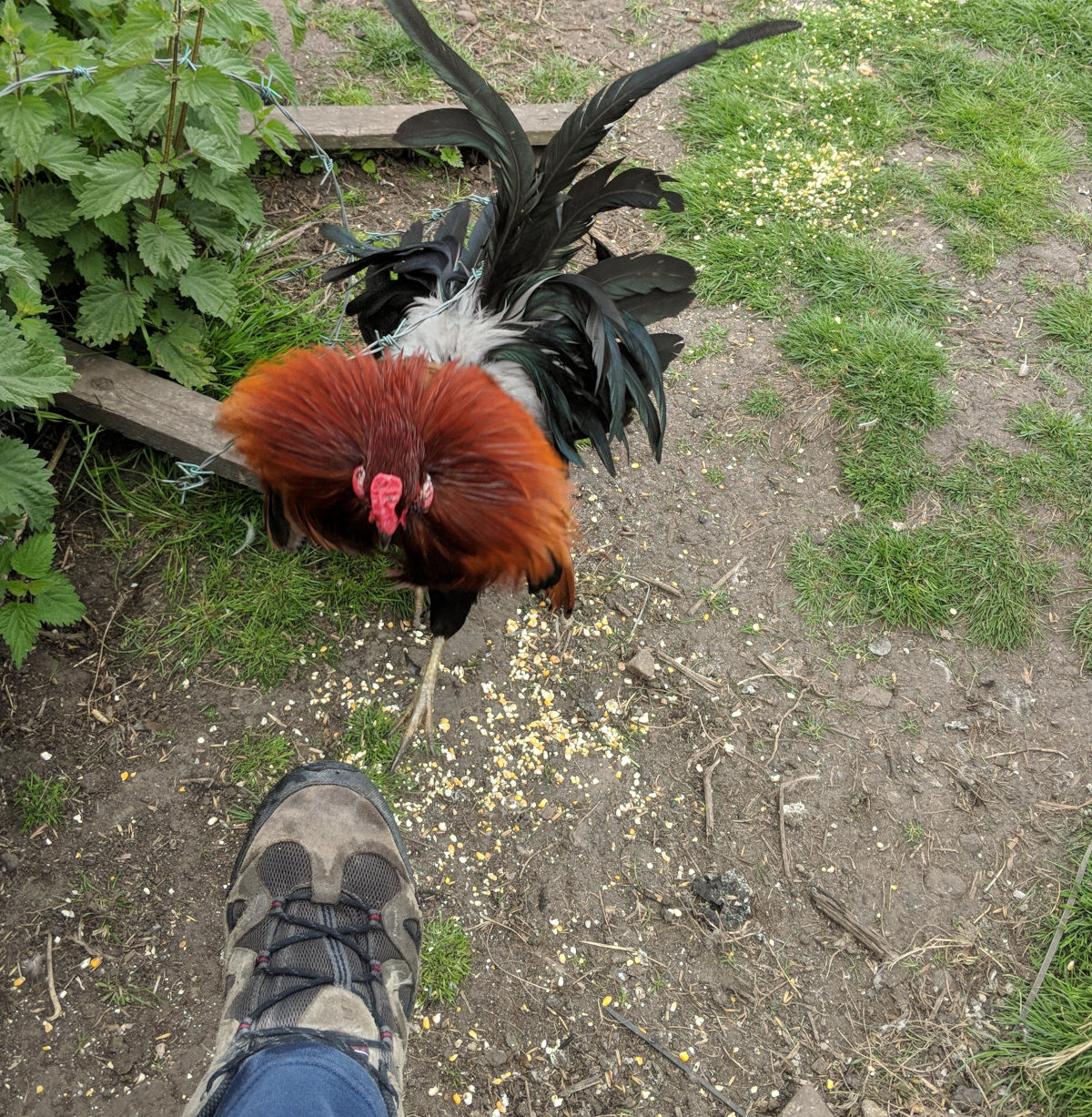
For the most part I am delighted with mine and have very few problems. Properly raised free range males can be kept happily together and are unlikely to be a problem.
I know your dying to know if I have ever failed and had to re-home one, the answer is yes, actually several. All have been oriental or game bird types and the worst culprit was a Saipan who always waited till your back was turned and then attacked from the rear.
Below: Pride is a word often associated with cockerels and roosters. Here s a Serama proudly strutting around.
Knowing what motivates their behaviour is key to understanding why they do certain things that we might mistakenly take as just being mean.
Young cockerels will spar with each other from a surprisingly young age and then seem to progress through a “teenage” phase where they seem to exist just to cause trouble. They will fight with each other and with their siblings. They will also challenge the authority of the alpha male if you have one in your flock.
A rooster is born programmed to do his rooster duties. At a certain age (around 4-6 months) he matures and his instincts take over, and their drive is very strong to do what nature has intended for them to do.
Eventually, they will settle down, the “teenage” stage passes, they will mellow a little. It is important, though to keep one rooster in with some hens. It is very unusual to be able to mix roosters in a small flock unless they get along very well. In a larger free range flock several cockerels will happily live in the same space.
Why keep cockerels and roosters?
There are several reasons why you might want to keep a rooster. Here are a few of the most common reasons:
- To produce fertile eggs. Hens will lay eggs even without a rooster, but the eggs will not be fertile. If you want to hatch your own chicks, you will need a rooster.
- For protection. Roosters are natural protectors of their flock. They will alert the hens to danger and fight off predators.
- For companionship. Roosters can be very friendly and make good pets. They are also very intelligent and can be trained to do tricks.
- For their beauty. Some roosters are very beautiful birds. They come in a variety of colours and patterns.
Of course, there are also some drawbacks to keeping a rooster. For example, roosters can be noisy, especially in the morning. They can also be aggressive, especially towards other roosters.
Below: Some male chickens are visually stunning.
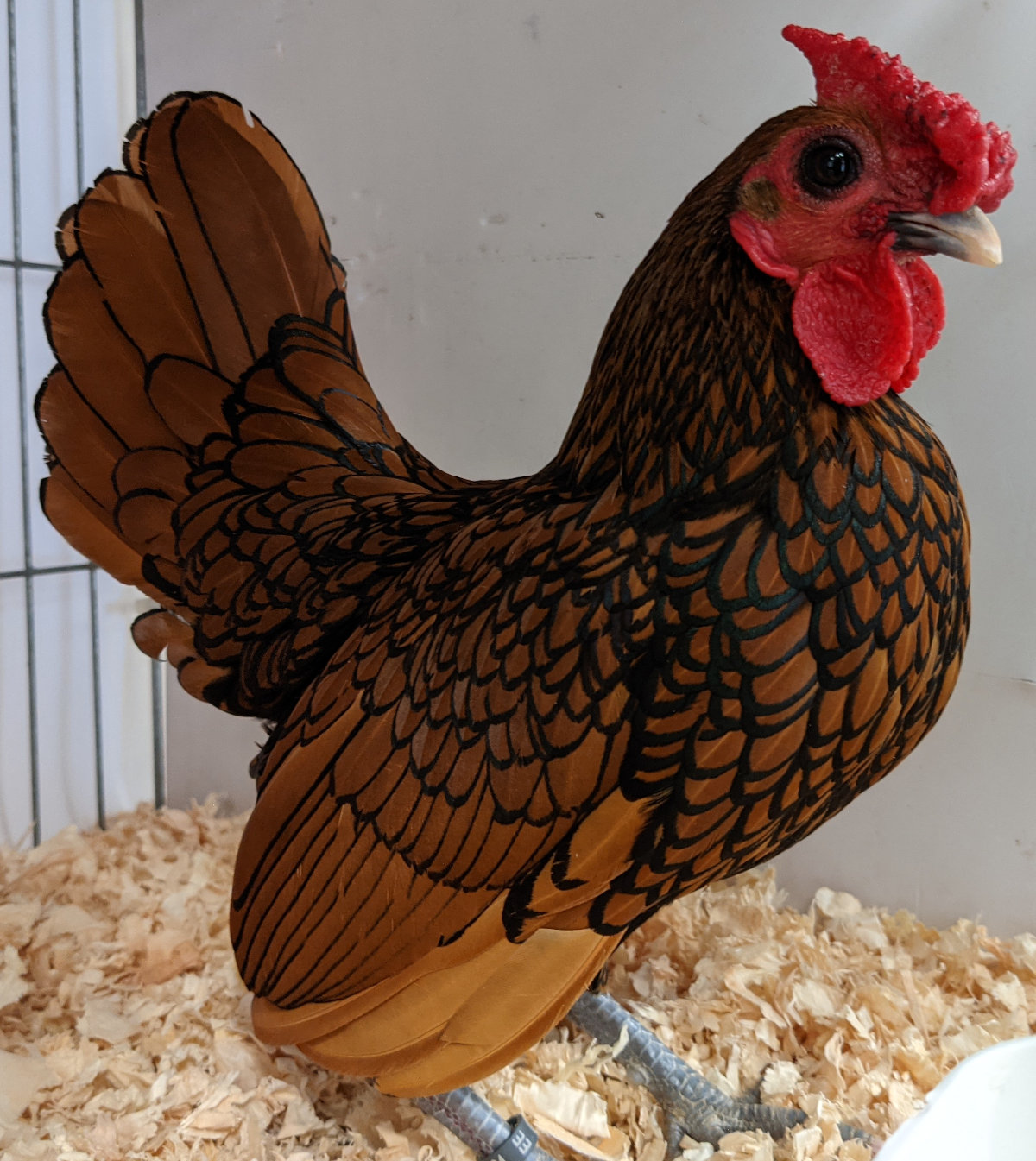
Ultimately, the decision of whether or not to keep a rooster is a personal one. If you are considering getting a rooster, it is important to weigh the pros and cons carefully.
Are you allowed to keep a cockerel?
Here are some additional things to consider when deciding whether or not to keep a rooster:
- Your local laws. In some areas, it is illegal to own roosters.
- Your neighbours. If you live in an urban area, your neighbours may not appreciate the noise of a rooster crowing in the morning.
- Your lifestyle. If you are not home often, a rooster may not be a good fit for you. Roosters need attention and care, and they can get lonely if they are left alone for long periods of time.
If you decide that a rooster is right for you, there are a few things you can do to make sure that he is happy and healthy. First, make sure that he has a large enough coop to live in. The coop should be well-ventilated and protected from predators. You should also provide him with a comfortable roost to sleep on.
Also don't expect him to get along with other roosters. That is also not in the programming. Very few roosters will get along without fighting and tearing each other up, even to the point of killing each other. The exception is when they grow up together but it still isn't a certainty.
Below: Breeding is the primary function as demonstrated by this fellow below busy treading his hens.
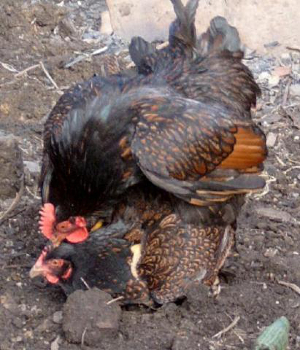
Generally, a ratio of 5 to 8 hens to 1 rooster is sufficient. You may get away with a few more if you have a young active rooster and a few less with tiny bantams.
Deciding If You Want A Rooster :
Before you buy or raise a rooster, or at least decide you will, you need to know if you can afford, house and want a rooster.
If you are overly afraid or apprehensive of dealing with a Cockerel then go no further and do not bother getting one.
The pros and cons of having a rooster in your flock:
| Pros | Cons |
|---|---|
| Protects the flock from predators. | Can be noisy, especially in the morning. |
| You will get fertile eggs. | Can be aggressive, especially towards other roosters. |
| Can be a loyal and loving companion. | Can be difficult to re-home if you no longer want him. |
| Can be a source of entertainment. | May not be legal in some areas. |
| Roosters are visually stunning, at least some of them are. | They are bigger and stronger than the hens. |
If you are not overly afraid of roosters then find someone with one a get used to being around one for a while before you take the plunge.
Crowing:
Can you cope with the crowing, they all do it and it can be annoying at early hours in the morning, roosters only do this to warn the flock of any dangers unless he's young and is just practising.
Crowing is territorial and other cockerels in ear shot make the situation worse. It is also the one thing that will ruin the relationship you have with your neighbours. There are supposedly many different ways to stop a rooster from crowing, but I personally wouldn’t bother, if you want one you will need to just put up with some of their behaviours. I disapprove of collars and devices to stop crowing
Can you afford A Male
Cockerels eat as least as much as a hen and as they don’t lay eggs there isn’t an immediate return on the investment of keeping one Sometimes it doesn't matter how bad you want a rooster, or even if you can house it, what really matters if you can feed it.
Roosters need lots of space in the place they roost, more than the hens, especially if they don't free range.
Buying a rooster:
Now you that you know you want one, your eager to go to the feed store and pick one up. But it's not that easy.
First you need to have everything ready at home, then you need to decide what breed, and age you want. It really depends how old your hens are, if you have them yet. I think it would be best to get a rooster about the same age, unless your hens are full grown.
I suggest integrating a rooster that is almost full grown. But if you want, you can raise him yourself so he's more used to you. Especially if you have kids, or just want him to be well mannered.
Breeds
There are so many breeds that it would be hard to pick one. As a general rule the larger the chicken the more docile they are. The quietest and best natured cockerel I have is a white Orpington.
Below: This young Wyandotte Cockerel is quite stunning:
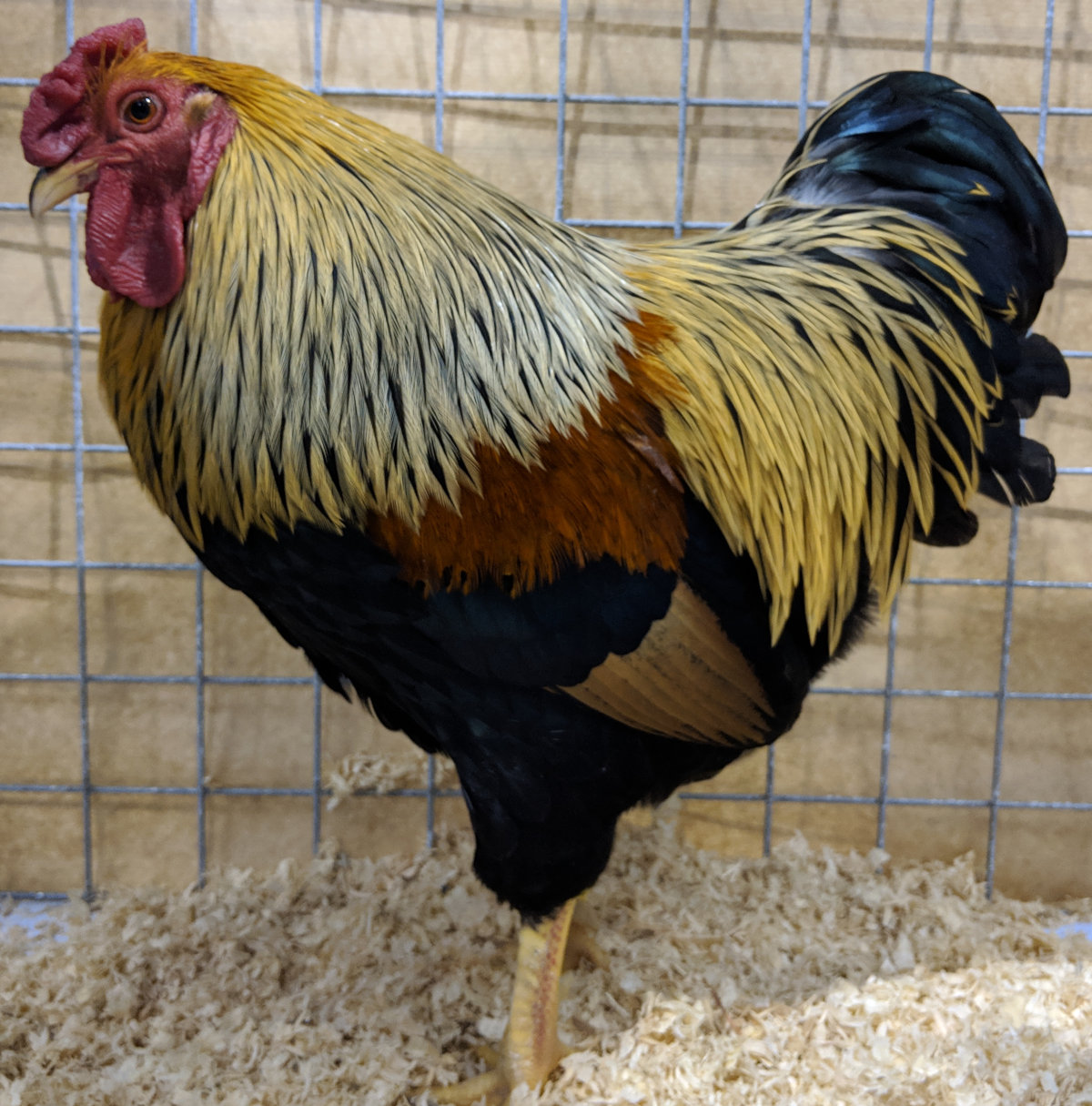
I recommend getting a young rooster and growing him on in the flock.
Roosters can be aggressive in different ways:
Biting and or pecking: Some roosters bite. They grab your skin really hard and pull. Usually when you go to pick them up this happens with aggressive roosters. They often break through skin and it can bleed quite badly and is incredibly painful.
Spurring: Some roosters will try to spur you. They jump up and flap and attempt to stick their spurs into your skin, it hurts.
Free range Partridge cockerel, above, large rare breeds tend to be easier to keep and more docile.
The easiest thing is to start young and prevent your rooster from ever becoming aggressive. Once they become aggressive, it is a lot harder to train them.
Always be Calm: Roosters will take you as way more of a threat when you aren't calm. Having a stressed out person is the worst thing of all for a rooster. Never hold your rooster when you are stressed out - be calm.
Just pick up your rooster, hold him for a little bit, be calm and gentle, and don’t do anything threatening. Let him know that you aren't going to hurt him or any of his hens.
Do not make threatening movements: Make sure you do nothing threatening towards your rooster. Don't wave your arms in the air around them, don't be loud, try not to run by them, and don't carry large objects or long poles while your rooster is near. Don't be rough with them, if you are it could cause him to be aggressive
Tameness: Some say to never tame a rooster because then they will never attack because they are afraid. I always tame my boys. I don't want my roosters to be afraid. I want them to know that I won't hurt them, I do not want my roosters to think I am some scary monster. I recently rescued 2 roosters, 1 is tame, the other is quite afraid.
I held the extremely scared one, and out of fear, he attempted to bite me. That is why, I suggest taming them, but also being calm and not threatening towards the rooster.

First of all, roosters have a kind of pecking order. The dominant is referred to as the Alpha male. When a rooster acts aggressively toward you, he thinks of you as either a predator or an underling. When you have males you need to be the dominant bird so to speak.
To modify behaviour you must be consistent each and every time he shows the slightest bit of aggression towards you or any human.
There are ways to deal with an aggressive birds and if you are concerned about being scratched, prepare by wearing long sleeves and leather gloves. Goggles are a good idea as well and tie back long hair as it might get pulled.
WARNING: This procedure is the last resort and is basically used to establish dominance, it can be dangerous to the rooster, if he has food in his mouth when you grab him he can choke.
At the first sign of aggression grab your rooster up, hold him flat on the ground by the legs, and let him flap, scream or whatever until he just lays there without moving, showing his submission to you. After he submits, let him go and repeat as necessary.
Please never hang a bird upside down it is never a good idea and is of no benefit. I have also seen this procedure done by getting a sturdy grip on his hackle feathers and holding him down till he submits.
The alternative is to grab your rooster up and hold him no matter how much he kicks, screams and protests. Get a firm grip and tuck him under your arm and wander around with him, let him calm down and stay that way for 15-30 minutes until he has settled.
Then put him down and if he kicks, screams or squawks while you are releasing him, pick him up and repeat this cycle until he submits to you, and will walk off peacefully when you let him down. Do this every time he shows aggression, repeat as needed. It is only likely to work on a young upstart, an older bird which has become used to being dominant is unlikely to submit.
This procedure should be used as a last resort before culling or re-homing.
Mating - Some will tell you not to let a rooster mate while in your presence, but I can only tell you from my experience that interrupting mating seems to have no effect in relation to aggression toward humans. My hobby relies on successful mating so interrupting them is counterproductive.
Biting - Sometimes a rooster will bite, usually when you pick up a hen who squawks, They will come flying over as they do not like having their ladies interfered with. I deal with this simply by grabbing his head and holding it for several seconds
Rooster Collar. I don’t use them, have never seen one used and do not approve of their use. It may also be illegal in the EU as it interferes with natural behaviour.
From their website - “The No-Crow Rooster Collar is made from mesh and Velcro, and fully adjusts to fit the rooster perfectly. They are worn with a pinky finger's width of space between the collar and your rooster's neck. The collar prevents roosters expelling the contents of their air sacs all at once, preventing them from unleashing a full-powered crow. While wearing the collar, they can still vocalize in all their normal ways--but the volume is limited. The collar is made to bend and flex with the rooster's neck so he can do everything he always does.”
Already got an aggressive or bad tempered cockerel. - If your rooster is already aggressive, that is okay. Try all the things listed below. If none work, then he may just remain aggressive, but my boys typically decide to be nice after I try things below.
Again, be calm. Never be stressed out around your rooster. Never be threatening in any way. Be gentle, if you are rough then your rooster may attack. Don’t turn your back. Don't wave your arms, don't be loud, try not to run past your rooster, and don't carry large objects when your rooster is near.
Fear: Your rooster is more likely to attack if you are afraid. So just walk proudly, and of course be calm.
Stand: If your rooster is coming over to attack, don't walk or run away. Stand still face him and try to ignore him. He probably won't attack if you do this. Every time your rooster comes over, do this, and he may decide to stop attacking.
Separate Your Rooster From Hens: Separate your rooster from all of his hens. Make sure he can't see or talk to any hens. Keep him in this separate pen for a month, if he isn't nice by then, it probably won't work. Just remember this method takes time and patience. Again as a breeder this method is a little pointless for me as I need my roo’s in with their hens.
How to deal with the surplus Roosters:
I am no nonsense and I am going to say something that is a bit of tough love and will probably offend a few people: - If you can’t deal with surplus males then don’t get into the situation where you have to.
It is important to note that some people believe that it is unethical to kill roosters for meat. If you are opposed to this, you should not choose this option.
Ultimately, the best way to deal with surplus cockerels is to find a humane solution that works for you. Consider your options carefully, and choose the one that you feel is best.
- Re-home them. This is the most humane option, and it is the best way to ensure that the cockerels will be well cared for. You can re-home them through a local animal shelter, a chicken rescue organisation, or online classifieds.
- Give them to a friend or neighbour. If you know someone who is looking for a cockerel, this is a great way to find a good home for them.
- Sell them. There is a market for roosters, and you may be able to sell them to a local farmer or butcher.
- Have them processed for meat. If you are comfortable with it, you can have the cockerels processed for meat. This is a humane way to end their lives, and it ensures that they will be used for something.
- Start early. The sooner you start looking for a new home for your cockerels, the more likely you are to find a good one.
- Be honest about the cockerels' personalities. If they are aggressive or noisy, be sure to let potential adopters know.
- Provide documentation. If you have any paperwork for the cockerels, such as vaccination records or pedigrees, be sure to provide them to potential adopters.
- Be patient. It may take some time to find a good home for your cockerels. Don't give up, and keep searching until you find the perfect home for them.
If you raise chicks from hatching eggs the law of averages says you get 50% males. There is no way you need that many unless you show birds and need to select from full grow chickens.
When you hatch a batch of glorious little fluff pots like these, statistically half will be cockerels! With Wyandottes like these below they can be sexed at hatching by the eye-line.
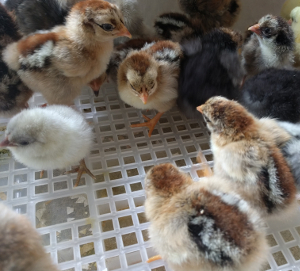
I recently visited a flock that had more cockerels than hens because the owner couldn’t deal with them and the result was a considerable amount of fighting and battered half bald hens that had literally had the feathers shagged off them.
This isn’t fair on the birds and causes stress and fighting and it’s not fair on the neighbours who have to listen to 7 cockerels in full voice. Not to mention the wasted feed and the loss of egg from stressed hens.
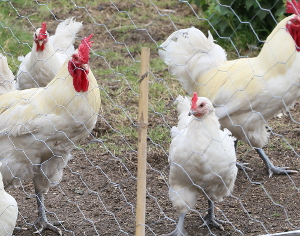
The advantage of Le bresse (above) is that they make excellent table birds.
That rooster’s entire mission in life will be to keep his flock safe so that he can populate your backyard with his offspring and let everyone know what he is up to, also only one rooster per flock, if you already have a rooster, in order to keep peace, one has to go as in the confines of a garden or backyard they will eventually come to blows.
The most important thing is to make sure your rooster will not be used for the illegal practise of cock fighting. To avoid this, be careful about advertising a free rooster. Some people suggest charging a nominal fee for the rooster to discourage someone from taking the animal for fighting.
FAQs About Roosters:
Q: What is a rooster? A: A rooster is a male chicken that is over one year old and has reached sexual maturity. It is known for its vibrant plumage and distinctive crowing.
Q: What is the purpose of having a rooster in a flock of chickens? A: Roosters serve several purposes in a chicken flock. They protect the hens, establish a pecking order, and act as an alarm system against potential threats.
Q: How can you distinguish a rooster from a hen? A: Roosters are generally larger than hens and have more colourful and elongated feathers, especially on their neck and tail. They also have larger, more prominent combs and wattles.
Q: Do you need a rooster for hens to lay eggs? A: No, hens can lay eggs without the presence of a rooster. However, if you want the eggs to be fertile and potentially hatch into chicks, you will need a rooster for mating.
Q: How often do roosters crow? A: Roosters crow throughout the day, but they are most vocal in the early morning and evening. They crow to establish their territory, attract hens, and communicate with other chickens.
Q: Can you keep multiple roosters together in the same flock? A: Keeping multiple roosters together can lead to aggressive behaviour and fighting. It's generally best to have one dominant rooster per flock.
Q: Are roosters aggressive? A: Roosters can exhibit territorial and protective behaviour, especially during mating or when they feel their flock is threatened. Some roosters may become aggressive towards humans or other animals.
Q: What should I feed my rooster? A: Roosters can eat the same diet as hens. A balanced diet of chicken feed supplemented with grains, vegetables and treats is ideal for their health.
Q: How long do roosters live? A: The lifespan of a rooster varies depending on breed and living conditions. On average, roosters can live between 5 to 10 years.
Q: Can you keep a rooster in a residential area? A: The legality of keeping a rooster in a residential area varies by location and local ordinances. Some areas may have restrictions due to noise concerns, so it's essential to check local regulations.
Q: What are some signs that a rooster is unwell? A: Signs of an unwell rooster may include lethargy, loss of appetite, difficulty breathing, abnormal droppings, and changes in behaviour. If you suspect your rooster is sick, consult a veterinarian.
Q: How can I introduce a new rooster to an existing flock? A: Introducing a new rooster to an established flock should be done gradually and with caution to minimise aggression. Provide a separate enclosure for the new rooster initially and allow the birds to get used to each other's presence before integration.
